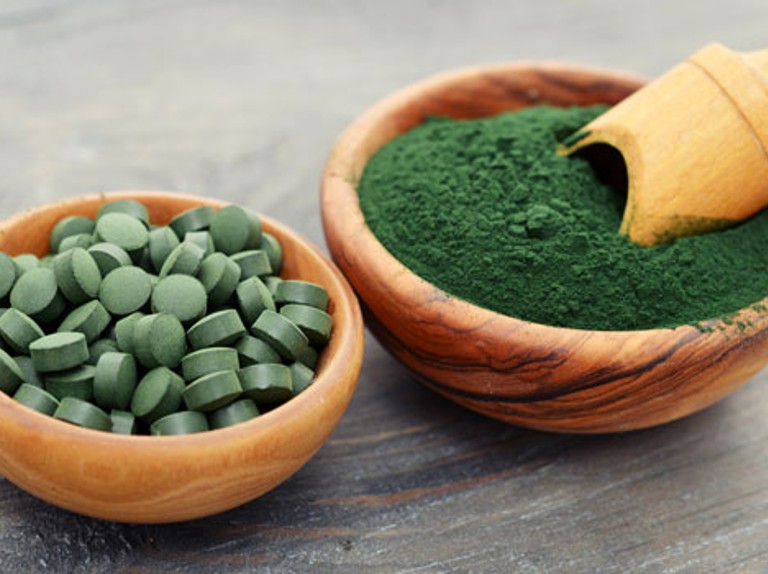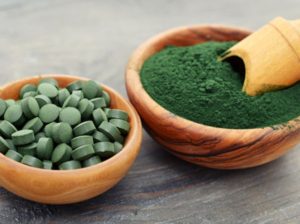
 Spirulina has gained immense popularity in the past few decades. It is loaded with various antioxidants and nutrients that may benefit your body and brain. Many experts and nutritionists advise adding spirulina to the daily diet for maximum health benefits. Before we move on to the health benefits of spirulina, here is what exactly spirulina is.
Spirulina has gained immense popularity in the past few decades. It is loaded with various antioxidants and nutrients that may benefit your body and brain. Many experts and nutritionists advise adding spirulina to the daily diet for maximum health benefits. Before we move on to the health benefits of spirulina, here is what exactly spirulina is.
Spirulina
Spirulina is an organism that grows in both salt and freshwater. It is a family of single-celled microbes that are often referred to as blue-green algae. It is a cyanobacterium that can produces energy from sunlight via a process called photosynthesis. The tiny algae is packed with various nutrients. One tablespoon, which is around 7 grams of dried spirulina powder contains protein (4 grams), Vitamin B1 (11 per cent of RDA), Vitamin B2 (15 per cent of RDA), Vitamin B3 (4 per cent of RDA), Copper (21 per cent of RDA) and Iron (11 per cent of RDA). 7 grams of powdered spirulina has around 20 calories and 1.7 grams of digestible carbs.
It has antioxidant and anti-inflammatory properties
Oxidative stress can harm your DNA and cells, which can cause chronic inflammation that can contribute to cancer and other diseases. Spirulina is a good source of antioxidant that protects one against oxidative damage. The antioxidant called phycocyanin also gives spirulina its blue-green colour. Phycocyanin can fight free radicals and inhibit the production of inflammation signalling molecules.
Can help lower bad cholesterol and triglyceride levels
Heart disease is one of the major leading causes of death all over the world. Spirulina can help lower your risk of heart disease by lowering bad cholesterol and triglyceride levels. Not just this, it also increases your good cholesterol levels. In a study of people with high cholesterol levels, 1 gram of spirulina per day lowered triglyceride levels by 16.3 per cent and bad LDL by 10.1 per cent.
Can help control type 2 diabetes
Spirulina is great for people suffering from type 2 diabetes. In a study of 25 people with type 2 diabetes, 2 grams of spirulina per day significantly improved these markers.
Has anti-cancer properties
There are evidences that suggest that spirulina has anti-cancer properties. Studies conducted on animals indicate that spirulina can reduce cancer occurrence and tumour size. Spirulina’s effect on oral cancer has been particularly well studied. A study examined 87 people from India with precancerous lesions, also called oral submucous fibrosis in the mouth. For people who took 1 gram spirulina per day for one year, 45 per cent saw lesions disappear as compared to only 7 per cent in the control group. When these people stopped taking spirulina, almost half of them redeveloped lesions in the following year.
Can help reduce blood pressure
High blood pressure if not treated on time can lead to various serious diseases like heart attacks, strokes and chronic kidney disease. 4.5 grams of spirulina per day has been shown to reduce blood pressure. The reduction in blood pressure is driven by increased production of nitric oxide, a signalling molecule that helps your blood vessels relax and dilate.
It may be effective against anaemia
They are different types of anaemia. The most common one is characterized by a reduction in the haemoglobin or red blood cells in the blood. Anaemia is common in adults and can lead to a feeling of weakness and fatigue. In a study of 40 people with a history of anaemia, spirulina supplements increased the haemoglobin content of red blood cells and also improved immune function.
A study conducted in February 2016 and published in the Journal of Nutrition Research recommends consuming around 4 grams of spirulina per day. However, it is possible to safely consume around 7 grams per day but one should not consume more than 15 grams per day.







